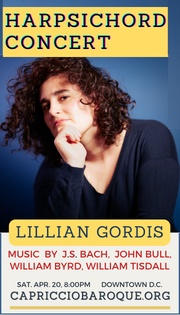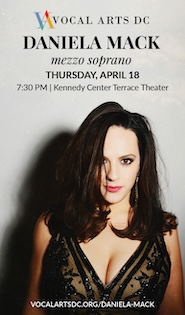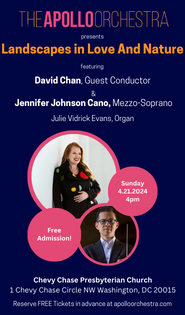Fleming makes brief but compelling return to Wolf Trap with the NSO

Renee Fleming performed with the National Symphony Orchestra Friday night at Wolf Trap. Photo: Andrew Eccles
The aura of stardom lingers around Renée Fleming like an exotic perfume.
In 2017, the American soprano stepped back from heavier operatic roles like the Marschallin in Strauss’s Der Rosenkavalier, making a turn to lighter musicals. That career shift did not deter a large crowd from turning out for her first appearance at Wolf Trap in fifteen years Friday night, in an hour-long program with the National Symphony Orchestra.
Since 2016, Fleming has served as an artistic advisor for the Kennedy Center for the Performing Arts, where the vocal series she curates is mostly devoted to Broadway and pop. (Her first foray into directing opera, a WNO production of Mozart’s Così fan tutte slated for last season, was canceled by the pandemic.)
Wolf Trap has further loosened the social distancing restrictions in the Filene Center since the NSO’s last opera program here in July. For the first time since the start of the pandemic, an audience sat together in packed rows facing the large orchestra filling the stage. About half of the more cautious patrons wore masks, but the coronavirus era seemed to be receding into the distance.
Following a warmup of two overtures performed by the orchestra, Fleming made her first appearance, clad in a mint-green gown. She immediately established her serious bona fides with Ravel’s Shéhérazade, rendering this subtle set of three songs with clear French diction and a transparent vocal tone. Conductor Patrick Summers, artistic director of Houston Grand Opera, skillfully wrapped the lush orchestration around his soloist as if carefully mixing watercolor washes.
The top of Fleming’s voice has faded a bit, but she sailed through the few full-throated challenges of the long first song, “Asie,” including the high B-flat that launched the NSO into a fortissimo frenzy. Fleming proved she could still cast a spell, as she held the audience in rapt attention with vivid storytelling. No one even dared clap between songs, as the frogs and night insects outside provided a calm backdrop.
Summers carved out plenty of space for his soloist to take her time, guiding the NSO through the complex palette of colors Ravel painted. The solos from principal flutist Aaron Goldman wove a mysterious veil in the second song, “La Flûte Enchantée,” and the amassed strings, two-score in number, swept in bold rushes in the final song, “L’Indifférent.”
Following another orchestral interlude, Fleming returned for just four more selections, none nearly as substantial as the Ravel. She was not quite able to simplify her tone appropriately for the Irish folk song “The Last Rose of Summer,” in the version interpolated into Flotow’s Martha, but she spun the traditional tune slowly and confidently.
Two brief arias made up the operatic portion of the program, beginning with “Musette svaria sulla bocca viva” from Leoncavallo’s La Bohème—not the best recommendation for listening to this lesser-known version. Not surprisingly, Fleming transfixed the audience with one of her beloved standards, “O mio babbino caro” from Puccini’s Gianni Schicchi, floating buoyant tenuto notes on the high, sighing phrases.
Summers opened the concert with the Overture from Mozart’s The Magic Flute. His gestures made the slow introduction a little shaky, but a clear and solid beat set the fast section on stronger footing, with sparkling contributions from cascading woodwinds. The brass handled their later take on the Masonic chords with broad-shouldered panache.
The highlight of the orchestral selections was the Overture from Gershwin’s Girl Crazy, a feverish survey of that musical’s hit tunes, including “I Got Rhythm,” “Embraceable You,” “But Not for Me,” and “Bidin’ My Time.” The blockbuster Hollywood arrangement by Robert McBride combined snappy percussion, like drum-kit and maracas in a Latin-flavored section, with swooning woodwinds down to bass clarinet and a boozy trombone solo.
Other Broadway selections included the waltz that opens Rodgers and Hammerstein’s Carousel, a nod to Fleming’s star turn in that show a couple years ago. Fleming concluded the evening with a joyous “I Could Have Danced All Night” from Lerner and Loewe’s My Fair Lady, complete with obligatory audience sing-along on the final verse.
Renée Fleming returns to the Kennedy Center Concert Hall with the NSO and other guest soloists for the Kennedy Center’s 50th anniversary concert 8 p.m. September 14. kennedy-center.org







